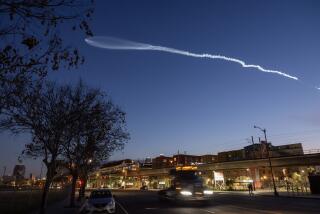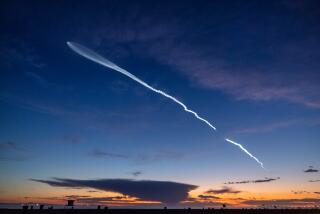Navy to Begin ‘Ship Shock’ Tests Next Month : Channel Islands: Three weeks ago, the military had announced delaying the underwater explosives program indefinitely.
- Share via
In a move that sparked criticism from environmentalists, the Navy said Tuesday that it will begin next month detonating underwater explosives to test ship hull strength--apparently one ship at a time--in an area west of the Channel Islands that is teeming with marine life.
The announcement of the “ship shock” testing program, published Tuesday in the legal notice sections of several Southern California newspapers, comes just three weeks after Navy officials said they planned to put the tests on hold indefinitely.
According to Navy officials, the service is seeking to initially test only the Aegis-class destroyer John Paul Jones next month in an area about 120 miles west of Point Mugu. The testing site is rich with marine mammals including migrating gray whales, and a variety of sea lions, seals, dolphins, some of which are federally endangered.
“It would appear that we want to test one vessel at a time,” said Lt. Cmdr. Frank Thorp, a Navy surface fleet spokesman in San Diego. “I haven’t read the documents yet, I don’t really know what’s going on with this (public notice). I do know that we plan to proceed with the tests sometime in April.”
The Navy on Tuesday also released a new environmental assessment of the proposed testing of the John Paul Jones.
Officials at the National Marine Fisheries Service, which granted the Navy a “letter of authorization” early last month for a five-year-long “ship shock” testing program involving several of the Aegis-class warships, said the announcement took them by surprise.
Scott Smullen, a spokesman for the National Oceanic and Atmospheric Administration, the parent organization of the fisheries service, said Tuesday that he was unaware of the change in the testing schedule.
“This is the first thing I’ve heard about this,” Smullen said.
A Navy spokesman at the Point Mugu Naval Air Weapons Station declined to comment Tuesday, saying they had not been briefed on the details of Tuesday’s announcement.
Navy officials have acknowledged that a small number of mammals may be killed during the testing.
Joel Reynolds, a lawyer with the Natural Resources Defense Council, a nonprofit environmental organization, said the Navy’s move may be an attempt to “segment” the shock trials--some of which involve the detonation of explosives as large as 10,000 pounds.
He said the plan may be a ploy by the Navy to minimize the heated criticism from environmentalists of the $38-million testing program.
“This doesn’t free them of their responsibilities,” Reynolds said. “This plan--if that’s what it is--gives us no comfort just because they are saying they wish to do the tests one at a time. All that it means is that we will now have to fight both test proposals.”
Earlier this month, fisheries officials--reportedly at the Navy’s request--said they would place their letter of authorization for the testing plan on “indefinite hold” until a testing schedule was determined and the Navy officially requested the permit.
But Navy officials said Tuesday they now are in possession of the permit. Officials declined to name a date for the test. They explained the discrepancy over whether or not they held the actual permit as a matter of “semantics.”
On March 7, the Ventura City Council added its voice to the growing debate over the testing by unanimously passing a resolution--believed the first in the county by a City Council--that implored the Navy to use caution while conducting the tests because of the ecologically sensitive nature of the proposed test area.
Alan Godley, a Ventura-based environmental activist and a spokesman for the Earth Island Institute, said Tuesday’s announcement was both frustrating and confusing.
“I think they’re trying to marginalize these tests,” Godley said. “They’re trying to reduce them so they might appear to be insignificant. That’s not the case. What they’re doing is significant and shouldn’t be allowed.”
The federally mandated testing procedure involves the detonation of underwater explosives at various distances from the ships to determine the strength of hulls, electronics packages in the ships and crew survivability. But before each test, extensive aerial surveys of the area will be done to check for marine mammals. If any are sighted, the tests would be moved or delayed, officials said.
Reynolds said that the resources defense council, along with legal representatives of other prominent environmental groups who are opposed to the tests, will continue to meet with Navy officials over the controversial proposal and have scheduled another meeting Friday in Los Angeles.
FYI
The U. S. Navy invites public comment on its plan to conduct “ship shock” testing of the destroyer John Paul Jones. Comments must be received by April 1 and should be addressed to Commander, Naval Sea Systems Command, Department of the Navy, Attn: Cmdr. E. Valdes, DDG-53 Shore Support Site, P.O. Box 82207, San Diego 92138-2207. Faxes can be sent to (619) 556-0238.
More to Read
Sign up for Essential California
The most important California stories and recommendations in your inbox every morning.
You may occasionally receive promotional content from the Los Angeles Times.













